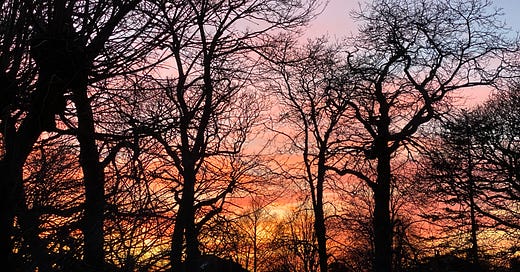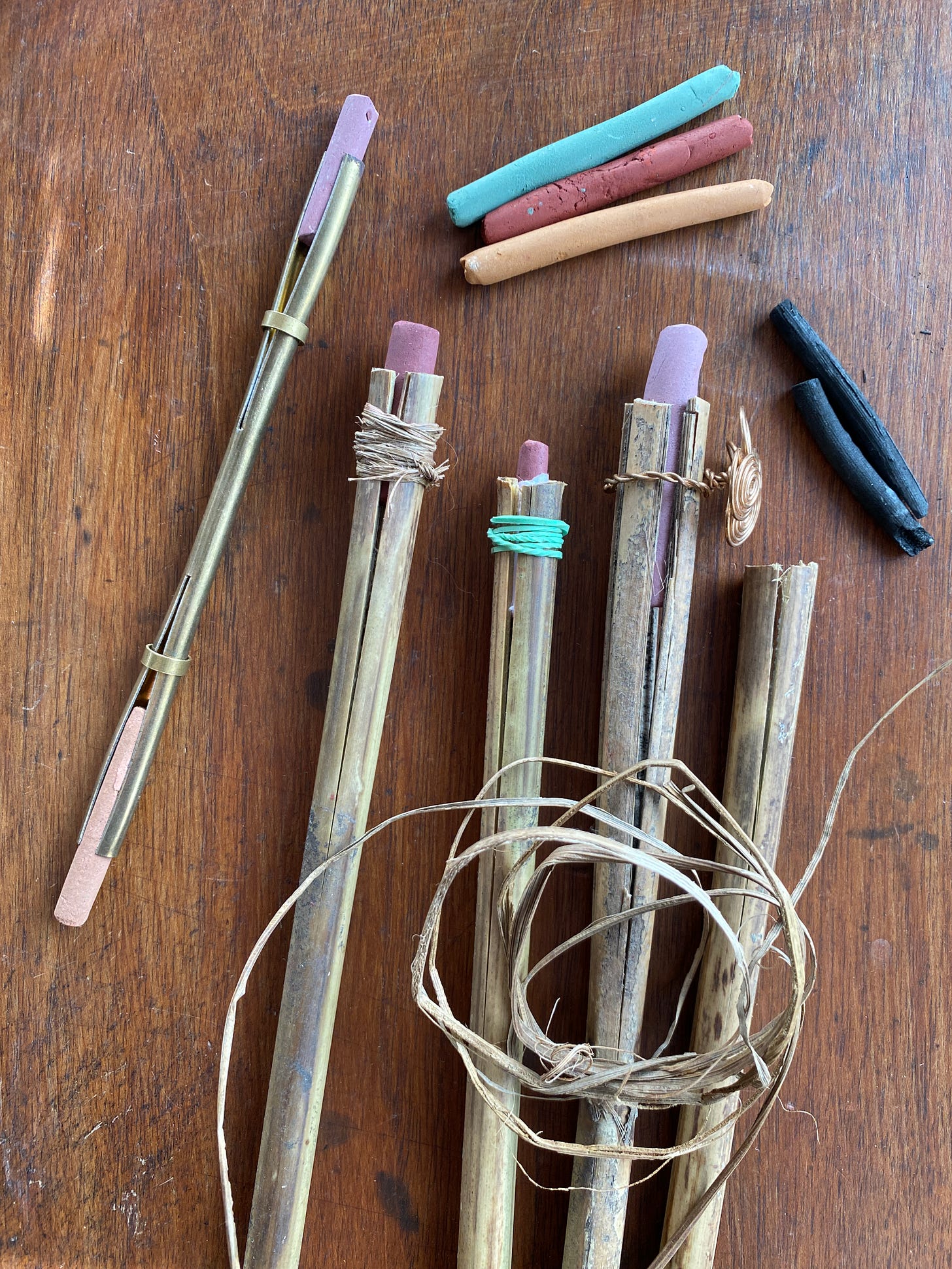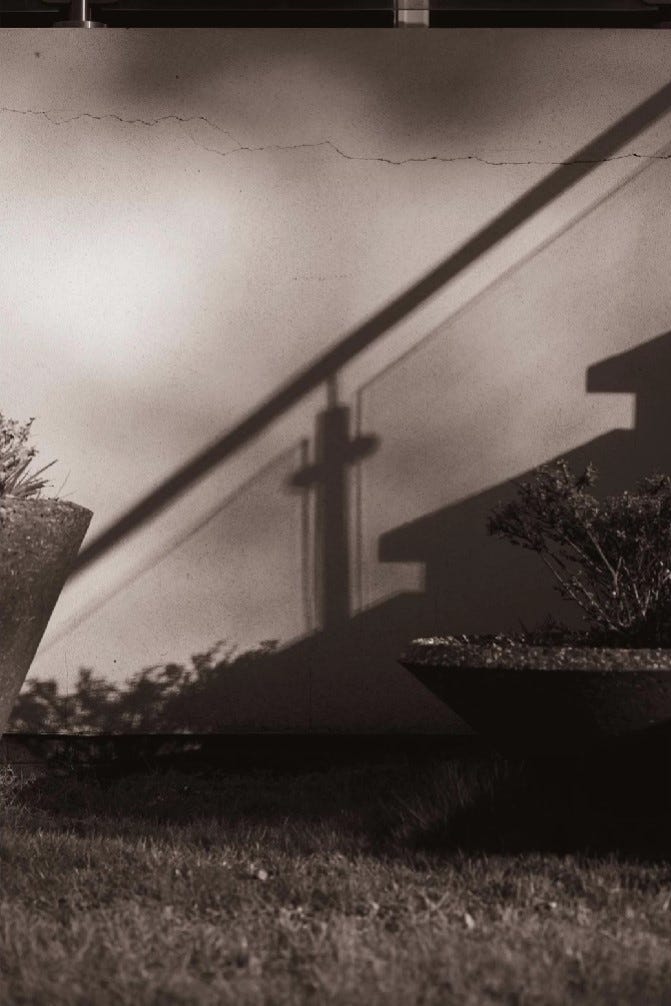Collars up against the digital storm
Welcome to C.O.W.L: 1 the College of Wayfaring Learners, Commitment to Other Ways of Looking, Creatures Of Wild Longing, the Centre for Outlandish Ways of Loving, Careful Overton Window Leaners, Creators Of Wandering Lines, Cast Out Wilderness Lovers.
Today’s piece was originally written this Sunday afternoon on my voice notes, standing beside the corner shop on the way to get milk. I got cold standing there but two words my late Grandmaster John Kells had said 18 years ago suddenly resurfaced like whales, pulling with them phrases following in their wake, so I tried to speak them out before they dived back down and were lost. I have edited for grammar, but it is otherwise left as-is.
Sometimes the hermitage is 20 feet from the main road and the parchment is an Apple. The cowl may be an acronym but Grace is always Grace. This is an ‘essay week’. Is this an essay? I don’t know. Anyway, here it is.
Fate
It's my fate to work with the fragmentary, the partial, detritus, the discarded and the unwanted.
Matter is holographic. If the Divine is in everything, then any one thing is a holograph of the whole. Completeness can be accessed through incompleteness more easily than through the search for completeness. Searching for ‘wholeness’ is a fool’s errand.2 Attention to the unwanted, the vestigial and the marginal always yields more than expected. The devil is not in the details, the devil is in the Grand Unified Theory. The Great Mystery is in the tiny details, the unforeseen events, the mysterious turns, the strange, small objects and strangers well-met on the path. It's found in the unexpected embrace, the impromptu dance, the fireside gathering bursting into song, the sudden meal assembled from scraps that tastes delicious, full of unlikely combinations: sausage and mango? Amazing.
Destiny
Destiny is fate animated by agency.
Most of the things I love best were formed by difficulty. The tannin formed in plants is to stop them being attacked by insects. The wisdom of my older sister was forged in the crucible of difficult beginnings. Strength of bones is made by resistance, loadbearing and weight carrying. Like those archers, the longbowmen of yore. When archaeologists dig them up, they know what they were, because they have such dense forearm bones from the pulling back of the bow string. Even in death their readiness marks them.
The chalk that I love to make paint with is the compressed, long dead bodies of creatures who were here before me under the water. So there's death and difficulty again, they're just part of life. If we can move with Grace through difficulty, we played the game well. We played our part.
I used to try to avoid pain and discomfort and I still don't seek them out but I found that anything I can now truly rely upon was made as a response to them. So how could I not be grateful? Some lineages of Tibetan Buddhism pray for the right obstacles and that seems like a sane prayer. To move through difficulty with Grace requires a certain kind of musculature. Just as the sprinter is not better than the long distance runner, and the shot-putter is not better than the tennis player, they just require different muscle groups to be highly developed to do the thing they need to do. To rise to the challenge they have to move appropriately, and each moves differently. It is not about judgment, but commitment.
I learn to rely on what is certain. What is certain is future difficulty. So instead of fearing and fighting this, I attempt to embrace it. I can start to think about what I might need to develop to move through the next difficulty with a certain degree of Grace. This is actually enjoyable, even though it is an acquired taste. The enjoyment lasts longer than than mere pleasure. The satisfaction of doing something well remains long after the job is done and it's surprising how smoothly a particular skill can move across from one part of life into another. Intellectual muscles you might require to write a short book on practical things, such as making paint, can really help when you have to put your thoughts in order when someone you love dies. So by embracing (if not actively seeking-out) difficulty3, certain kinds of challenge allow us to develop our uncanny musculature and this will be a benefit to overall health: mentally, spiritually physically, and not just for ourselves.
If we know we can rely on ourselves and that we don't have to worry about us, then we can be much more present for those we love. I learned this first not from a guru but from a Scottish mountain skills leader who was completely down to earth, Alan Crichton. He used to volunteer for the Cairngorm Mountain Rescue when he was not guiding people up Ben Nevis or teaching us to belay, do ice axe arrests, and dig snow holes. He was wiry, friendly and capable but he got all of that through a love of mountains, and by putting himself up and down them in all weathers in all seasons. Sometimes he had to pull bodies off the mountain in the dead of night, but he still went back up the mountain next day with some joy. His joy was supported completely from below, as he never had to worry about himself, his kit, his abilities. All sorts of things can happen on the mountain in the midst of difficulty, like my then-partner proposing on one knee on the way down Stob Bàn because he liked how I had kept good humour scrambling over the summit despite being scared, (a first!). Or perhaps you’ll see a brocken spectre.
So what I'm proposing for myself, and anyone else who wants to join in, is to train what is needed for the times ahead and not to sigh and wish we were in other times. Sometimes to work for things to be different, sometimes to work with things just as they are and to know when one method should have the upper hand, or when the other is more appropriate. That's a tricky one. I think there are some of us who are practical crew and some of us who are try to change things crew, and certain times in our lives we will be one, then the other. They are both needed, it's not like swimming with the current is worse than crossing the river to the other side. They are fitting at different times.
What they have in common is the willingness to get into the water.

Beauty
Shortly I will be speaking publicly online with my dear friend
about taking beauty seriously.4 Until lockdown, I had only ever once spoken to anyone online via a camera, in 2017. Now it is commonplace enough. Through these sleek devices may some real warmth flow. Now it is time to set up the desk and make a few notes, but not too many. Beauty is in the in-betweenness, the Third Heart, as John Kells called it. It is time to keep a centre line, to stay connected, but to relinquish control. Both of this post and of the discussion tonight.I’ll keep the living mountain in mind.
This week’s good thing: recent photography by Tom Fairhead. Tom lives locally and takes exceptionally good photos, often of the urban environment, transformed by an attention to light, composition and an understated beauty that I find compelling. This current series in an ongoing project explores ‘the weight, symbolism and responsibility of Christianity from an agnostic perspective’. I find it sensitive and timely.
Caro’s Obligatory Word Lists
I could have reported back from 20 years on that errand but it would make for dull reading.
Except for seeking it out as a mindful form of training which is sane, and is not masochism.
Paid subscribers will get a link to watch the whole 1 hour recording. Everyone will be able to see the first 40 minutes on Dougald’s YouTube soon.












Good session last night with Dougald's Q and A with beauty to hand. Thanks for the chance. And I liked the audience Q & A. Excuse my bullet point format - comes in handy for jottings that might be future coherent thoughts. Smile.
1.Your 'flyer' email a few days ago had me burrowing again in Ezra Pound's Pisan Cantos. He recalls his old friend WB Yeats asking Beardsley why he drew horrors. 'Beauty is dificult' came the reply. This becomes a theme recurrent in these Cantos, with beauty constantly appearing and disappearing in the poems, but remaining present.
2. I found therein also 'Pull down thy vanity, pull down ...' 'To have gathered from the air a live tradition or from a fine old eye the unconquered flame This is not vanity.'
3. From your Q & A re Craft / Art - I remember Mandalas from India in coloured sands erased and renewed daily. Our youngest daughter told us this long ago.
4. Or on another hand, the pianist rehearsing Chopin into old age, each day the music dying away.
5. I liked the notion of spells quoted by the magical animist lady written into the wooden boats, and I wonder about spiritual protection.
6. You made me think this morning about the coherent large 'brain' in the heart, autonomous as much as these things ever are, that talks with the hemispheres.
Thanks again!
Oh Caroline. Such a beautiful piece. It brought tears to my eyes. YES!
This has become my inquiry of late, when faced with any decision. "“Will this make me feel more alive, or is it just allowing me to be comfortable?” As someone raised at the teat of the machine (mixed metaphor, I know), I have tended to orient toward comfort and convenience. But life beckons. I'm willing to "get in the water" and I'm learning how to swim.